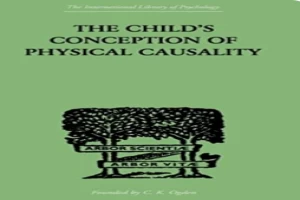صدر حديثًا
هذا الكتاب جديد وسيتم رفعه فور توفره لدينا وبعد الحصول على حقوق النشر اللازمة.

كتاب The Child's Conception of Physical Causality PDF
(0)
المؤلف:
جان بياجيهعدد القراءات:
95
اللغة:
الإنجليزية
الفئة:
علوم اجتماعيةالقسم:
الصفحات:
337
الجودة:
جيد
المشاهدات:
1811
اقتباس
مراجعة
حفظ
مشاركة
جديد
وصف الكتاب
Our encounters with the physical world are filled with miraculous puzzles-wind appears from somewhere, heavy objects (like oil tankers) float on oceans, yet smaller objects go to the bottom of our water-filled buckets. As adults, instead of confronting a whole world, we are reduced to driving from one parking garage to another. The Child's Conception of Physical Causality, part of the very beginning of the ground-breaking work of the Swiss naturalist Jean Piaget, is filled with creative experimental ideas for probing the most sophisticated ways of thinking in children.
The strength of Piaget's research is evident in this collection of empirical data, systematically organized by tasks that illuminate how things work. Piaget's data are remarkably rich. In his new introduction, Jaan Valsiner observes that Piaget had no grand theoretical aims, yet the book's simple power cannot be ignored. Piaget's great contribution to developmental psychology was his "clinical method"-a tactic that integrated relevant aspects of naturalistic experiment, interview, and observation. Through this systematic inquiry, we gain insight into children's thinking.
Reading Piaget will encourage the contemporary reader to think about the unity of psychological phenomena and their theoretical underpinnings. His wealth of creative experimental ideas probes into the most sophisticated ways of thinking in children. Technologies change, yet the creative curiosity of children remains basically unhindered by the consumer society. Piaget's data preserve the reality of the original phenomena. As such, this work will provide a wealth of information for developmental psychologists and those involved in the field of experimental science.
جان بياجيه
العالم جان بياجيه هو عالم نفس سويسري ولد في تاريخ 9 أغسطس من عام 1896م في نوشاتيل سويسرا، وقد كان أول من أجرى دراسة منهجية لاكتساب الفهم لدى الأطفال، وقد اعتقد كثير من الناس أن بياجيه كان الشخصية الرئيسية في علم النفس التنموي خلال القرن العشرين، وقد أولى اهتماماته في علم الحيوان، وذلك عندما كان شابًا ونشر مقالًا يتحدث فيها عن ملاحظاته عن عصفور ألبينو، وقد كتب العديد من المنشورات فيما يتعلق بالرخويات ونالت إعجاب الكثيرين، كما أنها وبحلول 15 عامًا اكتسبت شهرة بين علماء الحيوان الأوروبيين، كما درس علم الحيوان والفلسفة وحصل على الدكتوراه من جامعة نوشاتيل في عام 1918. اشتهر عالم النفس وعالم المعرفة الوراثي بنظريته في التطور المعرفي، والتي نظرت في كيفية تطور الأطفال فكريًا، فقبل أن تظهر نظريته كان يُنظر للأطفال على أنهم بالغون صغيرون، لكن بياجيه اقترح فكرة أن الأطفال يفكرون بطريقة مختلفة جدًا عن طريقة تفكير الكبار، وقد أثرت هذه النظرية على علم النفس التنموي وأصبحت فرعًا من فروعه، كما ساهمت بصورة كبيرة في مجال التعليم، وقد عُرف كرائد في النظرية البنائية، والتي تُشير إلى أن الناس يبنون معرفتهم بنشاط اعتمادًا على أفكارهم وخبراتهم، وقد بدأ يظهر اهتمامه بالعلوم الطبيعية في سن مبكر وتحديدًا في سن الحادية عشر من عمره، حيث بدأ عمله كباحث عندما كتب عن عصفور ألبينو.
اقرأ المزيد
الكتاب غير متاح حاليًا
هذا الكتاب غير متاح حاليًا للنشر. لقد حصلنا عليه من بموجب ترخيص المشاع الإبداعي، ولكن المؤلف أو دار النشر لم يمنحا الإذن بنشره.
قيم الآن
5 نجوم
4 نجوم
3 نجوم
2 نجوم
1 نجوم
اقتباسات The Child's Conception of Physical Causality
الأعلى تقييماً
الأحدث
اقتباس
كن أول من يترك اقتباسًا واكسب 10 نقاط
بدلاً من 3
التعليقات
كن أول من يترك تعليقًا واكسب 5 نقاط
بدلاً من 3